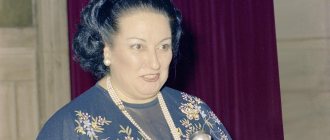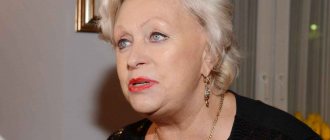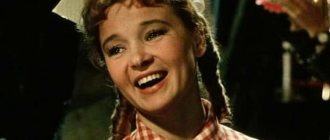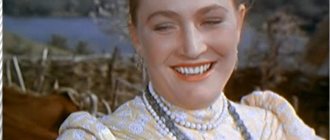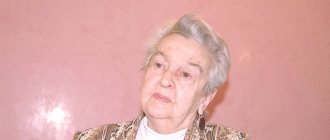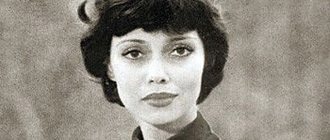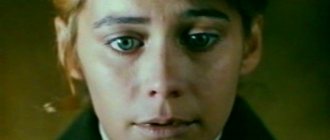Biography of Lyudmila Senchina
Lyudmila Senchina is a completely unique singer. Her voice, manner of performance, repertoire - all this clearly distinguished this original artist from other performers. This is a singer like no other. How did she come to the stage? How did her creative style develop? A biography dedicated to one of the most prominent singers in the history of the USSR and Ukraine will help you learn about all this.
In the photo: Lyudmila Petrovna Senchina
Childhood and family
The future Soviet pop star was born in a small village called Kudryavtsy, in the Nikolaev region of Ukraine. According to the singer herself, her real date of birth is 1950, and not 1948, as indicated in the document, since her father asked to make some adjustments to the birth certificate when registering his daughter - he wanted her to retire earlier . The girl was given a name at the age of 4; before that, her parents simply called her “Dotsya.”
Lyudmila Senchina in childhood
Luda, whose ancestry mixed Jewish and Moldavian roots, grew up in a family of ordinary Soviet workers. Mom, Sara Alekseevna, is a school teacher, father, Pyotr Markovich Senchin, worked all his life in a local cultural center, where he was first a cultural and educational worker, and then a director. After work, both worked in the collective farm field.
It was at the suggestion of her father that the girl began performing in front of audiences: first she appeared on stage with small roles in plays, then she began to perform songs at every more or less significant city event.
When the baby turned 10, her father received a tempting offer from Krivoy Rog. After weighing all the pros and cons, the family left their native village and moved to a new place. Here, in one of the largest cities in the Dnepropetrovsk region, Lyudmila Senchina began attending secondary school, and also honed her vocal talent in amateur clubs. It was during this period that she finally became convinced of her abilities and decided to try her luck on the stage. In 1966, she graduated from school, left Ukraine and went to Leningrad to enter the Rimsky-Korsakov Music School.
Lyudmila Senchina in her youth
The artist did not have time for the main round of exams in the vocal department. An incident helped her get into the music school: Having encountered the chairman of the examination committee already in the corridor, Lyudmila begged him to listen to her songs. Her performance of Schubert's serenade touched the teacher, and the girl received permission to come to the exams on another day.
Thus, in 1966, Lyudmila Senchina nevertheless became a student at the prestigious music school at the Leningrad Conservatory. Studying was not easy, but Rhoda Zaretskaya’s natural persistence and sensitive mentoring helped the artist discover her talent. Already in her student years, she was invited to sing at the Leningrad Operetta Theater.
Country childhood
The official date of birth of Lyudmila Senchina is considered to be January 13, 1948, as it is written in her passport. In fact, the singer was born on December 13, 1950. So the father decided to give his daughter a retirement gift and attributed it to a couple of years. Well, how could he have thought then that Lyudmila’s life and entire career would not be spent on collective farm fields, but on the best stages of the Soviet Union.
The girl was born on a Ukrainian stove in the village of Kudryavtsi, Nikolaev region. In the 1930s-1940s, Moldovan gypsies set up their camp in this place, and the father of the future singer, Pyotr Markovich Senchin, grew up there. His father (Lyudmila’s grandfather) was called Marco, he worked in the village as a blacksmith and, in memory of the camp, wore an earring in one ear until the end of his life. The paternal grandmother, Hannah, Moldavian by origin, did not know a single word in Ukrainian and spoke to her grandchildren in Romano-Moldovan.
Lyudmila’s mother, Sara Alekseevna (maiden name Fedorets) was born and raised in the village of Kudryavtsy. Here she worked as a rural teacher when she met her future husband, Peter Markovich.
There was no midwife in the village, and the mother’s birth was attended by a veterinarian. She slapped the newly born baby on the butt, and in response there was such a loud cry that the veterinarian could not resist and said: “Oh, and a vocal girl.” She also issued the first document for the future singer. On a simple piece of paper she wrote that the Senchins had a girl.
And only when the little girl had to go to school, dad took her hand and went together to the village council to register. The mother wanted her daughter to be registered with the name Zoya or Raya, but the father slyly said: “I know what to name myself.” So she became Lyudmila Senchina, for which she is very grateful to her dad, because the singer loves her name very much. That’s when her father added a couple of years to her in order to reduce the difficult village lot so that her beloved daughter could retire early.
And life was really hard in the village. From her early childhood, Lyuda worked a lot around the house - she fed chickens, carried water from a well, tended geese, and even churned butter from cream. When night came, the girl collapsed on a straw mattress, wrapped herself in a cotton blanket and instantly fell asleep in a deep, childishly sweet sleep.
Little Senchina worked all week and waited for Sunday in her heart. It was her favorite day, because everyone was relaxing, and her mother was preparing a mind-blowing Ukrainian borscht, mamalyga with cracklings, and in the summer dumplings with cherries for lunch. Lyudmila still remembers the taste of these dishes.
Star Trek by Lyudmila Senchina
In 1970, after receiving her diploma, Lyudmila Senchina went to work at the Leningrad Musical Comedy Theater. Over the next 5 years, she embodied many bright roles on this stage. Also in 1971, she performed at the Oktyabrsky Concert Hall with the song “Cinderella” by I. Tsvetkov and I. Reznik. Her image - a fragile blond beauty with bottomless blue eyes - was perfectly combined with the soulful manner of her performance. This song subsequently became her calling card and brought her the international Golden Lyre award in 1974.
Although Lyudmila herself initially reacted with hostility to the song. She saw herself as the new Edita Piekha, dreamed of a dramatic repertoire... and then they slipped her a “children’s” song! But what was the public reaction worth...
In an instant, the girl turned from an asterisk into a bright star. She began to be invited to films to play leading roles (“Shelmenko the Batman”, “After the Fair”, “Armed and Very Dangerous”). In the early seventies, she hosted the music program “Artloto” on the Central Television of the Soviet Union.
Still from the film “After the Fair”
In 1975, the artist was invited to the orchestra of Anatoly Badkhen, who became her second family for the next 10 years. In the same year, Lyudmila became the winner of the Sopot Music Festival, as well as a laureate of the prestigious television festival “Song of the Year”.
Her repertoire does not include as many hits as her beautiful voice undoubtedly deserved. Let’s note the compositions “By the Pebbles” and “Birthday”, the duet with Eduard Khil “Joke”, of course, the romances “Scented White Acacia Clusters”, “Song of Happiness”, “Love and Separation”.
Nature rewarded Senchina not only with her voice, but also with her external appearance.
In 1986, the singer took part in the “Child of the World” project - as part of the “warming of relations” with their American colleagues, Soviet artists went on tour to the States.
School of Music
When Lyudmila was finishing school, she accidentally heard an announcement on the radio about recruiting students for the vocal department at the Leningrad Rimsky-Korsakov Music School. Having received a certificate of secondary education, she went with her mother to Leningrad. Finding themselves in such a huge city for the first time, they were so confused that they were afraid to take a bus or tram and went on foot to look for the school. On the way, we stopped at a large department store and bought Lyudmila a new dress. By the time they found the educational institution, the legs were worn until they bled, and the doors of the school were already locked.
Lyudmila’s mother knocked for a long time until the watchman opened the door and explained that there was no one at the school anymore, and he needed to come tomorrow. And then it turned out that they were late for the main qualifying round. But, probably, Lyudmila was destined to become a singer, because by a lucky chance in the corridor they met a respectable man who turned out to be the chairman of the admissions committee. Mom persuaded him to listen to Luda. The girl was led into a huge empty hall, her new dress gave her confidence, and, after singing Schubert’s serenade, Senchina received admission to the next examination round.
So in 1966, Lyudmila became a student at the music school. At first it was very difficult. She was a plump girl, in Ukraine she was used to eating well, she used to cut a piece of bread in half, put lard with garlic in the middle and life was good. But in Leningrad everything was completely different; you had to find money for stockings or lipstick. Therefore, Lyudmila strictly saved on food, saving for all sorts of fashionable women's things from a small scholarship and the 30 rubles that her mother sent monthly.
Life in the new millennium
In the 90s and 2000s, Lyudmila Senchina toured and appeared on television quite rarely. The singer’s return to the stage was not even helped by the fact that in 2002 she became People’s Artist of Russia. Only in 2008 did Lyudmila Senchina make herself known again. The turning point for the aging singer was the project of the NTV channel “Superstar-2008. Dream Team": pop stars from the USSR and Russia were invited to the studio and divided into two rival teams. In 2013, she became a participant in another popular TV show, “Universal Artist,” which aired in prime time on Channel One.
Film and television
Soviet film directors paid attention to the bright and talented Lyudmila Senchina when she had just graduated from music school.
In 1970, the film “Magic Power” was released, consisting of three short stories. In one of them, Lyudmila played 2nd grade teacher Larisa Pavlovna. The teacher took her second-graders to the cinema for the premiere of “The Elusive Avengers”, and the kids, forgetting that they were at the cinema, decided to help “ours”.
In 1971, the premiere of the musical comedy “Shelmenko the Batman” took place, Lyudmila played one of the main roles in it - the daughter of the landowners Shpak, the marriageable lady Prisinka. The following year, viewers again saw Senchina in the title role in the feature film “After the Fair,” where she played the character of the peasant daughter Pavlinka, in love with a village teacher.
Directors vied with each other to invite Lyudmila to act in films, but she preferred the musical creative path. The artist appeared in another film and after that devoted herself entirely to music. In the film Armed and Very Dangerous (1977), she played cabaret singer Julie Prudhomme.
Senchina was repeatedly invited to television programs, projects, shows:
- presenter in the music program “Artloto”;
- participant in the musical projects “5 songs on “Fifth”, “Retro Stars”, “Superstar-2008. Dream Team”, “Universal Artist”, “New Year’s Eve 2014”, “Guess the Melody”;
- jury member in the Variety Theater project;
- The singer talked about her life in the programs “Alone with Everyone,” “Idols,” “Women’s Stories with Oksana Pushkina,” and “My Hero.”
Personal life of Lyudmila Senchina
In the life of one of the most brilliant women of the Soviet stage there were three husbands. Her first husband was the Leningrad operetta artist Vyacheslav Timoshin. He was 21 years older than his wife. The singer's only son, Vladislav (born 1973, currently lives in the USA), was born in his marriage.
Lyudmila Senchina's first husband - Vladislav Timoshin
The second husband of our today’s heroine was the Russian musician Stas Namin. This marriage seemed ideal: the spouses felt a kinship of souls, could spend nights having intimate conversations, losing track of time. However, the marriage eventually cracked - perhaps the reason was Namin's jealous nature.
In the photo: Lyudmila Senchina and Stas Namin
The singer was credited with an affair with Igor Talkov, but Lyudmila herself more than once noted that they were connected by a warm friendship. In addition, the artist was suspected of having a romantic relationship with Joseph Kobzon.
Vladimir Andreev, producer and third husband of Lyudmila Senchina
The last common-law spouse of the singer was producer Vladimir Andreev. Their relationship was exemplary - until Lyudmila's death.
Death
Lyudmila spent the last years of her life in her apartment in the center of St. Petersburg and in a country house in Gruzino. On January 25, 2020, the media reported the death of Lyudmila Senchina at the age of 68. The information was confirmed by her husband. According to him, the woman suffered from a long illness, which nevertheless took over, despite treatment.
Lyudmila Senchina in the last years of her life
Off stage
Senchina lives in an apartment in the center of St. Petersburg, and when she really wants peace and quiet, she goes to her favorite dacha in Gruzino. She doesn’t grow anything on the plot, she just rests there, body and soul. Sometimes he goes mushroom hunting with friends. She loves to cook and receive guests and says that cooking heals her. When the singer spins around in the kitchen, bad thoughts leave her head.
Lyudmila's greatest desire is often a good, sound sleep; she rarely manages to get a good night's sleep, since she spends a lot of time on trains.
The singer is almost not friends with sports. Senchina does not accept any heavy exercises, however, she has developed her own exercises. When the weather is dry and clear, Lyudmila goes to the stadium and walks at a fast pace for an hour.
